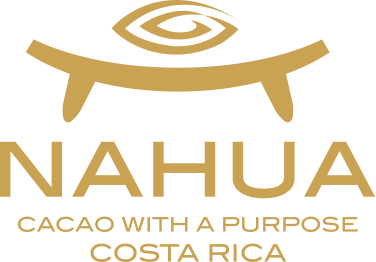





Keep this story going! Share below!
The Cocoa Renovation Program helps solve five of the UN SDGs: no poverty, good health and well-being, quality education, decent work, and economic growth. The program focuses on the growth of smallholder producers. Nahua’s field technicians and agronomists work with these smallholder producers to make sure they have all the knowledge and skills possible to be successful at what they do. Volunteer doctor visits are also provided as an option to ensure all farmers, their families, and other families in the remote areas are not neglecting their health.
The three-step process Nahua offers to address farmer productivity is education, equipment, and soil nutrition. With farming usually being a practice/job passed down generations, it is important to make sure that the current farmers are not holding on to techniques, practices, and ideas that would have been successful years ago, but are not now in the current farming environment. Teaching them how to use modern techniques and technology-related equipment is essential. Seminars are held in intervals throughout the year to ensure that the farmers are properly educated and that they keep up with the growth of the industry. Providing tools and soil nutrition requires an investment, which the farmers have to pay back in time, but with no interest. This gives them easier access to what they need to be successful with less debt and financial troubles, compared to borrowing from a bank with a high-interest rate. All these efforts work together to increase productivity, which ultimately works out to benefit Nahua even more.
Female farmers working with less land and less productivity simply because they are women is a big problem in the industry, and Nahua aims to change it. They realize that this issue is present across all the value chains, so they connect women in the industry for support to increase productivity. These efforts are all done under the Cocoa Renovation Program, which is committed to taking care of the environment through reforestation and sustainable farming practices.

Juan, the founder, and CEO was inspired due to the strong commitment the company has toward its community and through his own personal beliefs that there should be more women within farming.
Nahua is committed to assisting smallholder cacao farmers and actively seeking program improvements, which enables it to:
• Monitor and assess the progress made toward their goals
• Evaluate and improve farm productivity
• Increase farm management efficiencies
• Improve upon the sustainable cacao industry’s best practices.
When it comes to innovation, Nahua Cacao strives to be a sustainable leader and productivity generator within the cacao harvesting industry. According to research done by Costa Rica’s Tropical Agronomy Research and Investigation Center, scientists believe that chocolate could go extinct by the year 2050 due to disease and global warming. About one-third of cacao crops are affected by disease annually, most of which are grown in West Africa, where a single disease can annihilate an entire lot. Since Cacao trees can only handle certain temporal environments--areas with steady rain and humidity throughout the year--Costa Rica is poised to be one of the leading producers of cacao.
This business works on growing cocoa beans by going through a meticulous process to make sure their cocoa beans are some of the best. Grown in Nahua Costa Rica, they package about 50kg of cocoa beans to send off to California in the US all the way to Amsterdam. The process is important because they buy fresh cocoa from more than 400 small cocoa producers, and they have their own route where they meet up to purchase the cocoa from the businesses, every 15 days. The price that is paid to the farmer is $2.96/Kg, more than what would be paid at any other place. This is also why the farmers need to get the freshest and highest quality cocoa beans that are absent from any foreign objects. The Cocoa Renovation Program, a social impact project, focuses on the growth of smallholder producers. Nahua’s field technicians and agronomists work with these smallholder producers to ensure they have all the knowledge, health, and skills possible to be successful at what they do.
This is very innovative as for one, it helps smaller businesses because they are purchasing the cocoa beans from the business. What also makes this innovative is when the cocoa is purchased, it is registered through a mobile app and is assigned a batch number where from there it can be traced. The fermentation process leans further into innovation because of the giant crates/boxes that can hold up to 600 Kg of cocoa to allow the beans to ferment for five days. This fermentation process allows for the cocoa beans to obtain notes of yellow fruits, caramel, and cherry, as well as fruity acidic notes. All notes that customers have expressed more interest in.
The business benefit here is that they can get fresh cocoa to sell, and they also help the smaller businesses by purchasing from them in the process. The cocoa can be put in a multitude of recipes, such as gourmet chocolates, specialty coffees. They look to bring Costa Rican cocoa to new markets. Another benefit would be wanting to increase productivity, to help get products out faster, and make more cocoa beans. They are also trying to open to more markets, they want to have other parts of Costa Rica be able to grow, and sell cocoa beans as well, and they will gain new investment opportunities because they have the potential to make more money by having different areas of Costa Rica open to selling this.
The amount of revenue they make a year is less than $5 million and the number of employees is less than 25, but they have over 400 farmers. They keep the well-being of all their employees and make sure they’re healthy.
The biggest issues are gender inequality, and productivity, farmers have a problem solving very low productivity. Access to water/electricity. education and security are an issue because they are in Costa Rica, which lowers productivity as well. Female farmers own 15% less land and are 25% less productive than others, which causes a structural issue as well. They would also like to expand the land, and the cocoa crops, which is not that complicated. This is a massive benefit because if they are pushing gender equality to get more women to work, productivity will increase, there will be more women with jobs, and the business will be making more money.This business benefits the environment because cocoa beans are grown in a safe place, and no deadly chemicals or no toxins are used in the growing of the cocoa beans. Also, this benefits society because cocoa is packed with phytonutrients that are low in fat and sugar and are packed with healthy chemicals. The coca is also good for protecting against heart disease, cancer, and diabetes. It also reduces inflammation. So, this has many health benefits that can help society. And you don’t need to worry about bad chemicals being used to make them because there are none. They are all about making natural and healthy products.
Nahua Cacao is passionate about building locally and believes that it starts with financing. This business understands how hard it is for farmers to get the proper financing from banking institutions in order to cultivate the land due to farmers having limited assets and financial knowledge. To alleviate that burden, his company offers local farmers financing, with no interest rates, to help modernize their farming tools and use technologies designed to cultivate and sustain the land environmentally.
Adding in new technology and tools to help the environment, and having more women work, helps the environment. This innovation also helps the community, which has a direct impact, and they work directly with the female farmers to create a direct impact as well. This would help society because it is giving more women jobs and opportunities, and they will also be learning how to do farming in the process. They replicate the model to help different countries like for example Guatemala to bring their business to them and teach farmers over there how cocoa is raised. It’s great that they want to help other countries, share their knowledge with them, and teach them. Being able to help other countries and bring their cocoa beans to them will greatly help them and expand their business.
Get stories of positive business innovations from around the world delivered right to your inbox.
Juan Pablo Buchert, Founder / CEO


Nahua refers to the indigenous group of Aztec origin who settled throughout Central America and Costa Rica, and were the first to unlock the potential of cacao as the "drink of the gods."
Nahua Cocoa is based in San Jose, Costa Rica, and was founded in 2011. Nahua has a deep passion for fine cacao and outstanding chocolate.